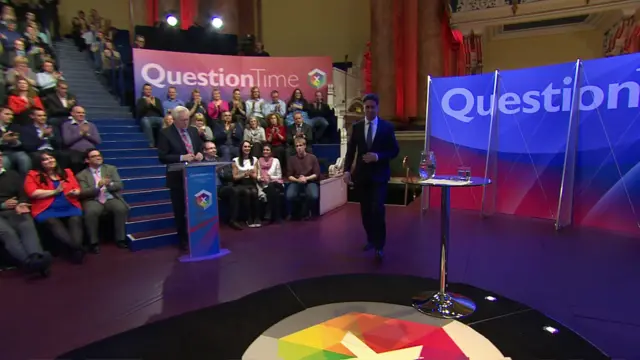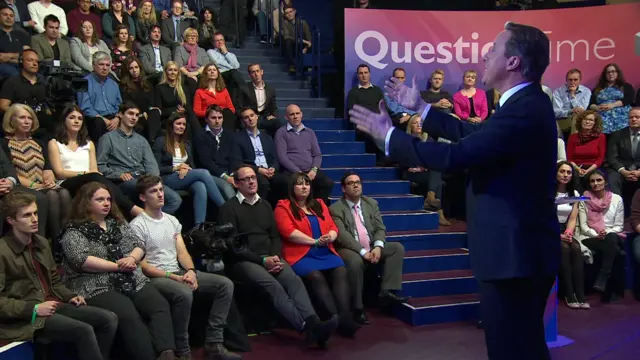Miliband and the economypublished at 20:44 BST 30 April 2015
BBC News Political Editor tweets:
David Cameron, Ed Miliband and Nick Clegg each faced the audience in a Question Time special
Mr Miliband rules out a Labour coalition or a deal with SNP, while Nicola Sturgeon says SNP MPs will have 'big clout'
The prime minister says he has no plans to cut child benefit or tax credits, despite Lib Dem claims
Mr Clegg says he's not sorry for his "brave and plucky" decision to enter coalition
Plaid Cymru's Leanne Wood hints at a deal with Labour, while UKIP's Nigel Farage says an EU referendum defeat wouldn't 'kill' his party
There are seven days left until the general election
Kristiina Cooper, Tim Fenton, Andy McFarlane and Andree Massiah
BBC News Political Editor tweets:
That was a strong accusation levelled at Ed Miliband. His questioner says Labour spent for 13 years and sold off gold on the cheap.
Ed Miliband says what they didn't do is build up other industries.
BBC Newsnight Political Editor tweets:
Mr Miliband says he does not accept that the last Labour government overspent but adds that "spending's got to fall. That's why we will reduce spending". He's accused of '"lying" about Labour's previous record by an audience member.
 Reality Check
Reality Check
Ed Miliband says he's going to reduce the deficit every year and balance the books. It's important to stress that what he means by balancing the books is not the same as what Mr Cameron means.
Labour wants to balance the current deficit, which means it could borrow money to invest. The Conservatives are not prepared to borrow for investment either and want an overall surplus by the end of the next parliament.
First question for Ed Miliband is how can people trust a Labour party that made a joke about leaving the Treasury with no money? The Labour leader admits the last Labour government made a mistake on banking regulation. "We've learnt that lesson," he says. Ed Balls, he adds, takes getting the deficit down "incredibly seriously".
The Labour leader faces the audience.

Finishing his time on stage, Mr Cameron calls for a "decisive outcome" to the election and promises a referendum on whether to stay in a reformed EU. He says the British people "deserve" it.
He wants "everyone holding that stubby pencil" in the voting booths to know they would get a referendum if they vote Conservative.
He ends by declaring that he will "do the right thing for the country".
Mr Cameron says he's aiming for an overall majority. He doesn't want to have to negotiate away parts of his programme in a "dark room with [Lib Dem leader] Nick Clegg". An in/out referendum on Europe is a "red line".
"I would not lead a government that did not contain that pledge," he says.
Margaret Longstaffe tweets:
 Reality Check
Reality Check
David Cameron says he has cut the EU budget.
Every seven years the EU agrees its long-term budget, the so called Multiannual Financial Framework (MFF), which is the overall spending ceiling for that seven-year budgetary period.
The leaders of all EU member states have to unanimously agree on the MFF, which the European Parliament scrutinises and votes on. The EU’s 2014-2020 budget was indeed cut for the first time in the bloc’s history.
Under the deal, the EU’s budget was cut by either 3.4% or 3.7%, depending on which measure you're looking at. David Cameron led a group of other EU countries in demanding a cut in the EU budget. The other two leaders taking part this evening also supported a cut.

A member of the audience asks Mr Cameron to answer these questions with a "moral dimension", saying his answers focus on economics. Mr Cameron replies that helping someone get a job and obtain a house have a "moral dimension".
Mr Cameron says he sticks with a target of below 100,000 for net migration. "I believe that's the right ambition," he says.
Bob Wilson, a firefighter, asks Mr Cameron how he would control immigration if we remain in the EU. The Prime Minister lists four changes he would make:
 Reality Check
Reality Check
David Cameron says that his government has added 7,000 more nurses to the NHS since the last election. This information comes from the number of “qualified nursing, midwifery and health visiting staff”, published by the Health and Social Care Information Centre, external.
The most recent data shows that the number of staff in this category has increased by almost 7,200, which is more than Mr Cameron suggested.
But, crucially, these figures include more than just nurses. The increase appears much less impressive if we remove midwives and health visitors from the data. On that basis, the number of nurses has gone up by just over 2,000 since May 2010.
Email: politics@bbc.co.uk
Caroline Rae:
Why are working people without children who work less than 30 hours not entitled to working tax credits? I have been working on a zero-hours contract since November 2013 and have never been so badly off. Reliant on food banks for at least six months. Please explain how working people are better off.
 Reality Check
Reality Check
David Cameron says that youth unemployment has been plummeting. The latest figures, external from the Office for National Statistics said youth unemployment was 16.1% in the three months to February. This is down from the preceding three months and lower than the same period a year earlier (19.2%). However, it is still higher than the pre-financial crisis low of 13.8% for the three months ending February 2008.
The PM argues: "The NHS grows with a Conservative government...You only have a strong NHS with a strong economy".
Mr Cameron has a difference of opinion with an audience member over the NHS. A man in the audience says: "Anyone with half a brain knows the NHS is not sustainable". The prime minister replies: "I don't agree with you, sir." To which the man responds: "Well, you're wrong."